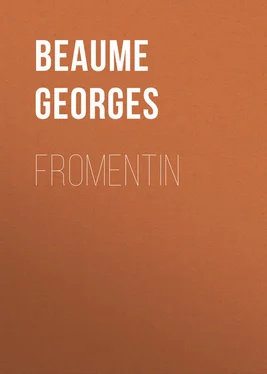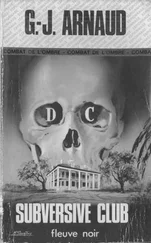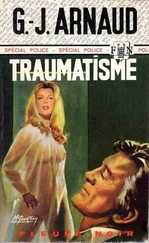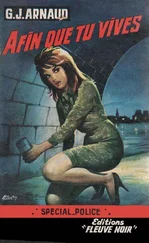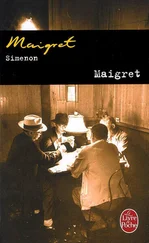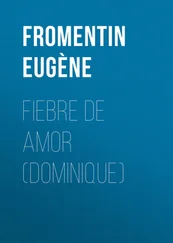Georges Beaume - Fromentin
Здесь есть возможность читать онлайн «Georges Beaume - Fromentin» — ознакомительный отрывок электронной книги совершенно бесплатно, а после прочтения отрывка купить полную версию. В некоторых случаях можно слушать аудио, скачать через торрент в формате fb2 и присутствует краткое содержание. Жанр: foreign_antique, foreign_prose, на английском языке. Описание произведения, (предисловие) а так же отзывы посетителей доступны на портале библиотеки ЛибКат.
- Название:Fromentin
- Автор:
- Жанр:
- Год:неизвестен
- ISBN:нет данных
- Рейтинг книги:5 / 5. Голосов: 1
-
Избранное:Добавить в избранное
- Отзывы:
-
Ваша оценка:
- 100
- 1
- 2
- 3
- 4
- 5
Fromentin: краткое содержание, описание и аннотация
Предлагаем к чтению аннотацию, описание, краткое содержание или предисловие (зависит от того, что написал сам автор книги «Fromentin»). Если вы не нашли необходимую информацию о книге — напишите в комментариях, мы постараемся отыскать её.
Fromentin — читать онлайн ознакомительный отрывок
Ниже представлен текст книги, разбитый по страницам. Система сохранения места последней прочитанной страницы, позволяет с удобством читать онлайн бесплатно книгу «Fromentin», без необходимости каждый раз заново искать на чём Вы остановились. Поставьте закладку, и сможете в любой момент перейти на страницу, на которой закончили чтение.
Интервал:
Закладка:
In Paris, he lived at first by himself and in seclusion. His aversion to vulgarity and extravagances of speech or manners was ridiculed by some of his comrades, who nicknamed him “little Monsieur Comme-il-faut.” He followed the courses in the law school only halfheartedly, but was assiduous in his attendance at the lectures of Michelet, Quinet, and Sainte-Beuve, in the Sorbonne.
As a connoisseur of the beautiful in human handiwork, Fromentin soon learned to love Paris and to appreciate, in her environs, Versailles, Saint-Germain, Montmorency, those picturesque landscapes that combine the charm of nature with the glorious high-lights of history. Although without a teacher, he spent more and more time in sketching the changing forms of life, and strove, so far as it lay in him, to retain in his drawings the secret tremors of the soul. “These are his first stumbling utterances as a landscape painter,” wrote M. Louis Gonse in his extensive and admirable work, critical as well as biographical, in which he has reproduced the earliest known sketch by Fromentin, a scene from Chatterton , drawn the morning after a performance of De Vigny’s drama at the Théâtre Française. This pen-and-ink sketch, dated April 2, 1841, shows facility, sureness of touch, and a certain felicity in composition.
Far from relinquishing his literary efforts, Fromentin applied himself, from this time onward, with increased ardour, and, throwing off the trammels of romanticism, produced poems, critical studies, and even a comedy, written in collaboration with his friend, Emile Deltrémieux.
From this time onward, Fromentin held firmly to a conviction on which all his efforts as painter and author were destined to be based: namely, that an artist, instead of imitating the masters, should draw his inspiration solely from himself, from his own emotions and memories, and that, if he aspires to speak sincerely, in a new and original language, he ought to belong to some one country, to reflect its image and to repeat its accent. As a matter of fact, he himself was not, excepting in appearance, uprooted from his native soil. In the depths of his inmost consciousness, there always resounded the echo of his province.
But for the time being, while he amused himself in studying the reasons for things and administering to himself doses of his own keen analysis, he suffered from that curious affliction of dual personality which, twenty-five years later, he described in Dominique : “That cruel gift of being able to look on at one’s own life as at a performance given by someone else. Sensibility is an admirable gift; in the order of creation it may become a rare power, but on one condition: namely, that one does not turn it against oneself.”
Having taken his licentiate’s degree, Fromentin pursued his studies for the doctorate. He entered the law office of M. Denormandie. There he met, as fellow clerks, the future lawyer, M. Nicolet, and Forcade de la Roquette, destined later to become minister. Here Fromentin spent his time chiefly in drawing sketches on the desk pads, the margins of legal pleadings, and even the panels of the doors. One day he descended into the courtyard and covered the coach-house, stable, and party-wall with his artistic efforts. He paid long and frequent visits to the Louvre. The Italian school left him wellnigh indifferent. In the French school he ranked Chardin above all the rest. But already his chief enthusiasm was reserved for the Dutch. The Ford , by Wynauts, with figures by Berchem, and Ruysdaël’s Sunstroke and Dyke beaten by the Sea fascinated him. At times, he conceived a fine passion for Rubens. Rembrandt, however, from first to last, was very nearly, if not quite, incomprehensible to him. “He reproached Ingres,” records M. Louis Gonse, “for being an imitator of Raphael; nevertheless, he declared, after seeing one of Ingres’ sketches, that he was a sculptor of the first order . As regards music, he knew Mozart and Beethoven only by reputation; he loved Bellini, Donizetti, etc., and the entire sensualistic school of Rossini.”
Apparently Fromentin was now hesitating between two paths, that of the fine arts and that of belles-lettres. It is my own deep conviction that his choice had already been made. He knew that literature, worthily conceived and liberally practised, cannot become a career capable of supporting the man who follows it. He saw daily, with his wise and prudent judgment, that painting, on the contrary, can guarantee bread and fuel to an artist of real talent, respectful of his art and loyal in his efforts. Accordingly, he wrote henceforth in his leisure hours, and when the mood was on him, economizing his strength and hoping only that the art of his written word might attract attention and perhaps awaken sympathy.
At last, unable to endure any longer the legal dust of M. Denormandie’s office, he boldly confided to a friend of the family his horror of judicial procedure, and confessed his desire to devote himself wholly to painting. This friend, Charles Michel, promptly went to La Rochelle, to open negotiations with Dr. Fromentin; and the latter, after a vigorous protest, ended by yielding. But, priding himself on his knowledge of such matters, he insisted upon choosing Eugène’s instructor, and selected the painter Rémond, who at that time represented the academic school of landscape painting. Fortunately for him, Eugène did not remain long in Rémond’s studio, but left it to enter that of Cabat. A correct and careful artist, and one of the best, next to Dupré and Rousseau, Cabat had opened a new path for landscape painting – a path in which it would not be very hard to discover the influence which this celebrated master of the landscape exerted over the earlier manner of his pupil, through his sympathetic understanding of his subjects and the grace and distinction of his art.
Конец ознакомительного фрагмента.
Текст предоставлен ООО «ЛитРес».
Прочитайте эту книгу целиком, купив полную легальную версию на ЛитРес.
Безопасно оплатить книгу можно банковской картой Visa, MasterCard, Maestro, со счета мобильного телефона, с платежного терминала, в салоне МТС или Связной, через PayPal, WebMoney, Яндекс.Деньги, QIWI Кошелек, бонусными картами или другим удобным Вам способом.
1
Eugène Fromentin, Lettres de Jeunesse .
Интервал:
Закладка:
Похожие книги на «Fromentin»
Представляем Вашему вниманию похожие книги на «Fromentin» списком для выбора. Мы отобрали схожую по названию и смыслу литературу в надежде предоставить читателям больше вариантов отыскать новые, интересные, ещё непрочитанные произведения.
Обсуждение, отзывы о книге «Fromentin» и просто собственные мнения читателей. Оставьте ваши комментарии, напишите, что Вы думаете о произведении, его смысле или главных героях. Укажите что конкретно понравилось, а что нет, и почему Вы так считаете.
